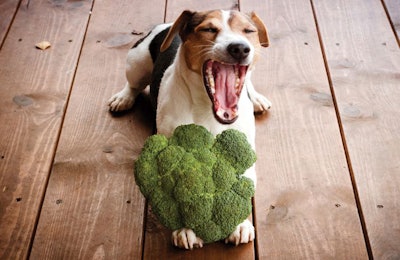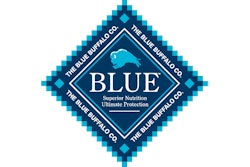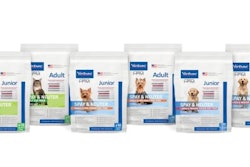
Vegan pet owners often want to mirror their own dietary choices in their pets’ foods. Vegan pet food must not contain animal-derived ingredients, such as beef, poultry, fish, dairy, honey, eggs or other animal products. Instead, vegan pet food uses plant-based ingredients such as fruits, vegetables, grains and legumes to meet pets’ nutrition needs. Vegan dog and even cat foods now exist on the market, but research on the diets remains limited.
Researchers at the University of Illinois in Urbana-Champaign conducted an experiment to determine the amino acid digestibility and energy content of vegan dog foods. The vegan dog foods were made with human-grade ingredients and mildly cooked. Human-grade pet foods contain ingredients stored, handled, processed and transported in a manner that complies with regulations set for human food production. The mild cooking may have reduced degradation of amino acids in the vegan dog foods during processing.
The vegan dog foods were compared to foods made with chicken as the main protein source. The scientists used the precision-fed cecectomized rooster assay to test the amino acid digestibility of the dog foods, while intact roosters were used to test total metabolizable energy.
“Although testing in dogs is required, these data suggest that mildly-cooked human-grade vegan dog diets are well digested,” the scientists wrote in the journal Translational Animal Science.
Experiment on vegan dog food digestibility
In the experiment, the researchers tested two mildly-cooked human-grade vegan diets, Bramble’s The Cowbell and The Roost, and an extruded dry kibble diet, Blue Buffalo Life Protection Formula Chicken and Brown Rice recipe. The Cowbell’s recipe included organic pea protein, lentils, and whole peas for protein. The Roost contained organic pea protein, garbanzo beans, and whole peas as primary protein sources.
“The mildly-cooked human-grade vegan diets tested in the current study performed well, easily meeting the crude protein and amino acid needs of dogs according to AAFCO and FEDIAF, having high amino acid digestibilities, and having high energy contents that exceeded current metabolizable energy equations and estimates.”
Most indispensable and dispensable amino acids across all diets had digestibilities higher than 80%, with a few exceptions. The scientists observed only one difference in indispensable amino acid digestibility among the three diets. Tryptophan’s digestibility was higher in the chicken-based dog food than in The Cowbell.
Vegan dog food seems to have amino acid digestibility and energy content on par with animal-based diets.














